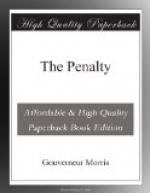“It’s a good way to live,” said Barbara. “If you’ve got sense enough to know that it’s good while it’s going on. People who speak of the good old days, or who are always looking forward to better days, are usually unhappy. All the time I’ve been washing your clothes and mine this morning I kept saying, ’Now this is really good—this is really worth while,’ and once when I got the better of an ink-spot, my heart began to beat as if I’d just finished some immortal work.”
They were much amused with Bubbles, who came out to them for the Christmas vacation. The short fall term had already stamped him with the better ear-marks of the great New England boarding-schools. He was quite a superior person, rather prone to quotes just as if they had been facts out of the gospel, the sayings of Mr. This and Mr. That. And he used superior words, and spoke of various Kings of England as if he had always known that such persons existed. He had in addition a smattering of Latin, his pride in which he strove in vain to conceal. And most of all he considered the school-boy captain of the foot-ball team a creature, on the whole, wiser and more knowing even than Abe Lichtenstein.
But by the time he had been a week in camp he was himself again. And by the time he returned to school he had forgotten the ablative singular of Rosa.
They thought best to tell him that he would have plenty of money some day. In view of this would he persist in being a secret service agent? He thought so. He wasn’t sure. The service needed money often and always service. Had he seen his father? Yes, and he told them about the interview.
“And,” said Bubbles, “he sent me a box Thanks-giving, There was a cold turkey and caramels and guava jelly and ginger-snaps, and walnut meats and seedless raisins, and, and as Mr. Tompkins says, it doesn’t do to be too hard on a man.”
[Illustration: They were much amused with Bubbles, who came out to them for Christmas vacation]
LIII
Spring came. Their mine made its first shipments of ore and was no longer a paper success. The balance-sheet for the first month after shipments had begun made Wilmot whistle. He couldn’t believe the figures, and worked till late into the night, trying to find some dreadful error. Finding none, finding that with the help of others he had really made good at last, the rough life began to lose its savor. If he still owed money it could be but for a short time. He was free as air—free to do what he pleased—almost to spend what he pleased.
“Barbs,” he said, the next morning, “the mine’s no good; we’ve got to tackle something else.”
“What do you mean, no good? Why, you said—”
“I know what I said. The mine is a success. Aside from what your father has, you’re a rich woman. And I’m a rich man. And that’s the difficulty. There’s no use working our hearts out over a thing that’s a definite success—is there? No fun in it. We’ve got to look round for something else. Now we are always going to have money—that’s certain. What are we going to do with it? Think of something hard—something worth while.”




